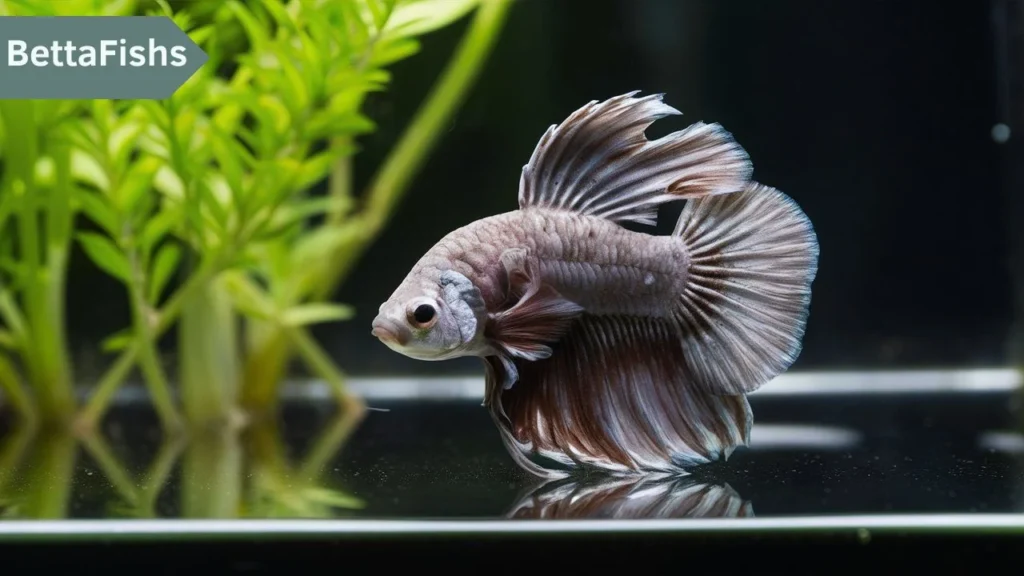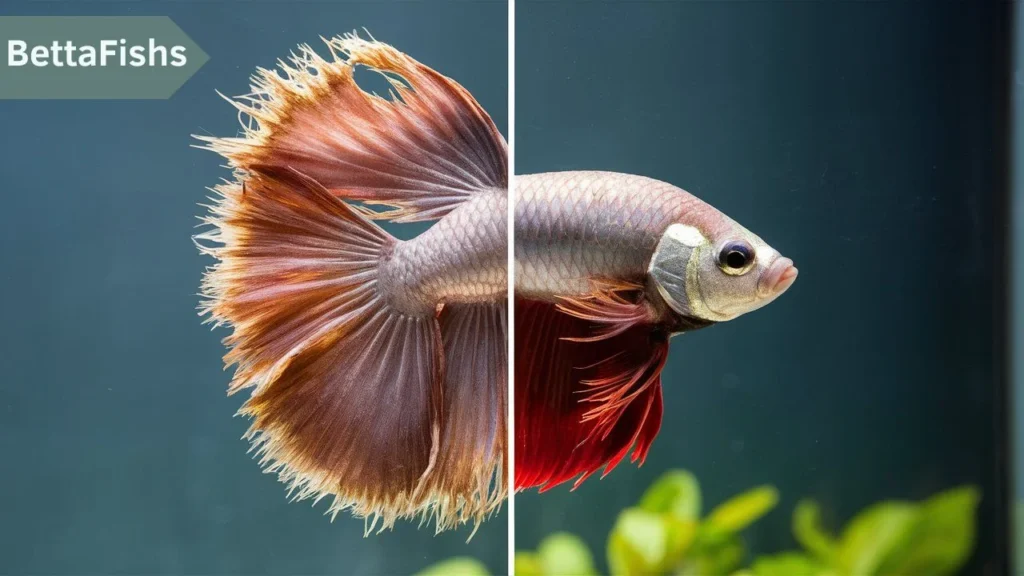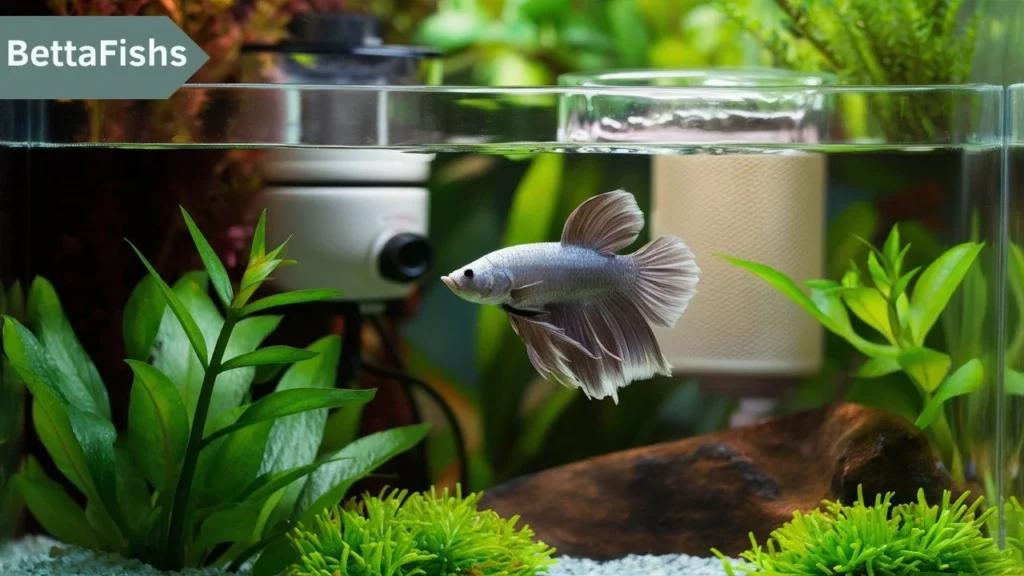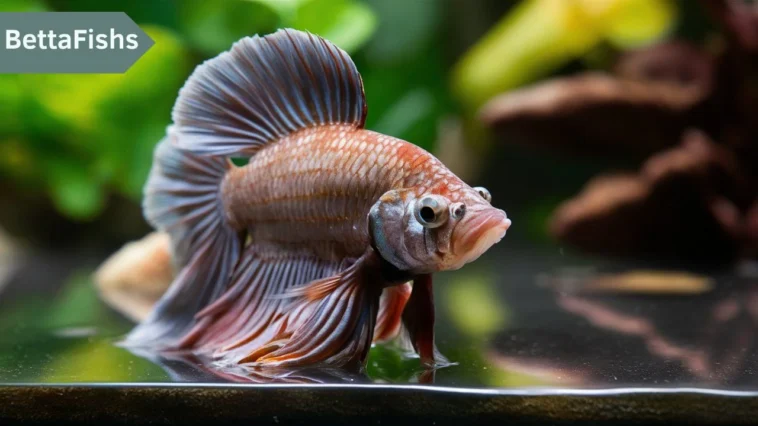Betta fish, often known as Siamese fighting fish, are a popular choice for aquarists due to their vibrant colors and unique personalities. But in order to keep them healthy, just like any pet, they need to receive the right care. The common health issues that Betta fish may face are crucial for any responsible fish owner. This guide will walk you through the most prevalent “ Betta fish health issues “, how to identify them, and what you can do to prevent and treat these issues.
Common Betta Fish Health Issues
Symptoms of Illness in Betta Fish
Recognizing the early signs of illness in your Betta fish can make a significant difference in their recovery. Some common symptoms include lethargy, loss of appetite, clamped fins, discoloration, and erratic swimming. If you notice any of these signs, it’s essential to act quickly to identify the underlying issue.
Stress in Betta Fish
Stress is a major factor that can lead to health problems in Betta fish. Causes of stress can range from poor water quality to sudden changes in their environment. Signs of stress in Betta fish include hiding, rapid gill movement, and faded colors. Reducing stress is key to preventing further health complications.
External Parasites and Infections
Ich (White Spot Disease)
Ich, or White Spot Disease, is one of the most common parasitic infections in Betta fish. It appears as little white dots on the body and fins of the fish. This disease is highly contagious and can spread rapidly in an aquarium. Treatment usually involves raising the water temperature and using over-the-counter medications specifically designed to eliminate Ich.
Velvet Disease
Velvet Disease, also known as gold dust disease, is another parasitic infection. It gives the fish a velvety, gold-colored appearance. This disease can be fatal if not treated promptly. The usual treatment involves using copper-based medications and ensuring the tank is in complete darkness for several days.
Fin Rot
Fin Rot is a bacterial infection that causes the edges of the fins to fray and deteriorate. Poor water quality is often the primary cause. If left untreated, Fin Rot can progress and lead to severe damage or even death. Regular water changes and antibacterial treatments are essential for treating this condition.
Fungal Infections
Fungal infections usually appear as white, cotton-like growths on the Betta fish’s body or fins. These infections are often secondary, meaning they occur as a result of other underlying issues like injuries or poor water conditions. Antifungal medications are typically effective in treating fungal infections.

Internal Parasites and Digestive Issues
Swim Bladder Disorder
Swim Bladder Disorder affects a Betta fish’s ability to swim properly. Fish with this disorder may float uncontrollably at the water’s surface or sink to the bottom of the tank. Overfeeding or constipation often leads to this condition. Feeding your Betta fish high-fiber foods, like peeled peas, can help alleviate this issue.
Constipation
Constipation is a common problem in Betta fish, usually caused by a diet that’s too high in protein and low in fiber. Symptoms include bloating and a lack of appetite. To treat constipation, you can fast your Betta for a day or two and then feed them a small portion of a cooked, deshelled pea.
Internal Parasites
Internal parasites are harder to detect than external ones, but symptoms include weight loss, lethargy, and abnormal feces. Deworming medications are often required to treat internal parasites. It’s essential to act quickly as these parasites can severely impact your Betta’s health.
Environmental Factors Affecting Betta Fish Health
Water Quality and Parameters
Maintaining optimal water quality is crucial for Betta fish health. Poor water conditions can lead to stress and a host of diseases. Ensure that your tank is properly cycled, and use a water testing kit regularly to check for ammonia, nitrites, and nitrates. Regular water changes are necessary to keep these parameters in check.
Tank Size and Space Requirements
Betta fish need adequate space to thrive. A tank that’s too small can cause stress and make them more susceptible to diseases. A minimum of 5 gallons is recommended for a single Betta fish, allowing enough room for swimming and maintaining a stable environment.
Temperature and Heating
Betta fish are tropical fish that require a stable temperature of around 78-80°F (25-27°C). Fluctuating temperatures can stress the fish and weaken their immune system. Investing in a good-quality heater with a thermostat is crucial for maintaining a consistent temperature in the tank.
Lighting Conditions
While Betta fish do not need special lighting, they do benefit from a regular light-dark cycle to mimic their natural environment. Too much light can lead to stress, while too little can affect their natural behaviors. A balanced approach is to provide 8-12 hours of light followed by a period of darkness.
Diet and Nutrition for Healthy Betta Fish
Balanced Diet for Betta Fish
A balanced diet is essential for maintaining the health of your Betta fish. Being carnivores, they do best on a diet high in protein. High-quality Betta pellets, supplemented with frozen or live foods like brine shrimp and bloodworms, ensure they get the necessary nutrients.
Common Dietary Issues
Overfeeding is a common issue that can lead to obesity, constipation, and other health problems. It’s essential to feed your Betta fish in small portions, once or twice a day. Observing their behavior during feeding can help you adjust the amount to avoid waste and overfeeding.

Preventing Betta Fish Health Issues
Regular Tank Maintenance
Regular tank maintenance is key to preventing many health issues in Betta fish. This includes weekly water changes, cleaning the tank and filter, and removing uneaten food and debris. A clean tank environment greatly reduces the risk of disease.
Quarantine Procedures for New Fish
Introducing new fish into your tank without proper quarantine can bring in diseases and parasites. It’s essential to quarantine new fish for at least two weeks before adding them to the main tank. This practice helps in identifying any potential health issues before they can affect your Betta fish.
Stress Reduction Techniques
Reducing stress is vital for the overall health of your Betta fish. This can be achieved by maintaining a stable environment, providing hiding spots, and avoiding sudden changes in the tank conditions. A calm, stress-free environment will promote a healthy and vibrant Betta.
Treatment of Betta Fish Diseases
Medications and Treatments
There are various medications available to treat common Betta fish diseases. These include anti-parasitic, antibacterial, and antifungal treatments. It’s important to follow the dosage instructions carefully and to treat the whole tank if the disease is contagious.
Home Remedies and Natural Treatments
Some Betta owners prefer to use home remedies or natural treatments for mild health issues. For instance, adding aquarium salt can help with minor infections and stress. Garlic juice is sometimes used as a natural anti-parasitic. However, it’s important to consult with a professional before trying these methods.
When to Consult a Veterinarian
If your Betta fish is not responding to treatments or if you’re unsure about the diagnosis, it’s best to consult a veterinarian who specializes in fish. They can provide more accurate diagnoses and prescribe stronger medications if needed.
Recovery and Aftercare
Monitoring and Adjusting Care Post-Treatment
After treating your Betta fish for any illness, it’s crucial to monitor their recovery closely. Keep the tank conditions optimal and continue to observe their behavior and appearance. Adjust their care routine as needed to ensure a full recovery.
Signs of Recovery in Betta Fish
Signs that your Betta fish is recovering include a return of appetite, active swimming, and bright colors. It’s important to continue providing a stress-free environment and maintaining good water quality to support their recovery fully.

Conclusion
Proactive care is the best way to ensure that your Betta fish remains healthy and vibrant. By understanding the common health issues and how to prevent them, you can enjoy many happy years with your Betta. Regular maintenance, a balanced diet, and a stress-free environment are the cornerstones of good Betta fish care.
FAQs
What are the first signs of illness in Betta fish?
The first signs of illness in Betta fish often include lethargy, loss of appetite, and changes in coloration. Other symptoms can include clamped fins, erratic swimming, or visible spots on their body.
How can I prevent my Betta fish from getting sick?
Preventing illness in Betta fish involves maintaining clean water, providing a balanced diet, and minimizing stress. Regular water changes, monitoring water parameters, and quarantining new fish are essential preventive measures.
What should I do if my Betta fish stops eating?
If your Betta fish stops eating, first check the water quality and temperature. Sometimes, offering a variety of foods can help stimulate their appetite. If the issue persists, it may indicate an underlying health problem, and you should consult a veterinarian.
Can Betta fish recover from fin rot?
Yes, Betta fish can recover from fin rot with prompt treatment. Regular water changes, maintaining clean water, and using antibacterial treatments are crucial for recovery. In severe cases, a veterinarian may need to be consulted.
How often should I clean my Betta fish tank?
For a healthy Betta fish, it’s recommended to perform partial water changes weekly and a full tank clean once a month. Regular cleaning helps maintain water quality and prevents the buildup of harmful substances




